Grace Tierney's Blog, page 26
February 11, 2021
Eleven Ways to Squeeze in a Read
Hello,
As a Reading Ambassador for Ireland Reads I’ve been thinking about how busy most of us are and how to squeeze in a read. I’ve often been accused of constantly “having your nose in a book”, so I may have a few ideas you haven’t tried yet. I hope they help.
Hanging Around for your Kids
If you’re a parent you are likely to find yourself waiting for your offspring many times during an average week. At school pick-up, collecting from parties, or transporting them to various activities. This is dead time and can easily be upgraded to reading time by keeping a book in the car. Be warned, if they catch you reading a thriller rather than watching when they score in a match, you’ll be in big trouble.

Commuting
More people are working from home right now, but trust me, commuting can be classic reading time. I’ve cried with laughter over a Christopher Brookmyre novel on the Dublin to Drogheda train. Books are perfect for public transport but if you walk, cycle, or drive to work you can always try an audio book, or story podcast.
Breakfast or Coffee Break
Some people can’t start their day without a coffee, I can’t start mine without a book. If you’re not a morning person it is safest for everybody if you immerse yourself in a story rather than growling at chatty housemates and colleagues.
Queuing
Does anybody enjoy standing in a line? We’ve all become experts at it this year (my record was two hours to get groceries for my mother last April). Bring a book and be the envy of everybody else, but don’t get too engrossed and delay the queue.
Phone Reading
No, not doomscrolling! You can read ebooks on your phone. I know one bookworm, previously a paperback queen, who now reads 90% of her fiction on her phone. You will never be caught without a book again.
A Paperback in your Pocket
In the 1930’s Allen Lane changed book-reading forever when he decided to produce Penguin paperbacks that would fit in a pocket and sell for a reasonable price. The classic orange and white volumes were a huge hit. Don’t get me started about the scandalous lack of good pockets in female clothing, but if you have a pocket, or carry a bag, always keep it filled with a paperback and you’ll be ready to squeeze in a read. I sometimes buy books purely because they are small format and perfect for this method.
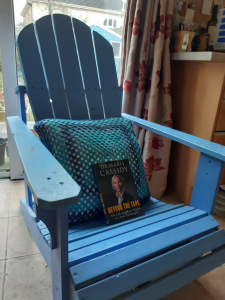
My reading chair, with my chosen Ireland Reads book for 2021
Dinnertime Reading
It is possible to cook dinner and read a book at the same time. I know this because I do it. Once upon a time my lovely husband made an adirondack chair and painted it blue to match our garden shed. The chair paused at our back door because of a rainy day and by the end of the week everybody had decided they liked it there, in the kitchen, and didn’t want it to be ruined by weather in the garden. It’s still there, with the addition of my crochet cushion, and it is a perfect reading chair.
If you’re cooking risotto you may need to stand over the hob with book in one hand and spoon in the other, but for many meals you can place a dish in the oven, or use a cooking timer to alert you when to stir or turn on the next saucepan. Then retreat to your chair and dive in until the beep-beep starts. If you’re really keen you can try an audio book while chopping vegetables, but I find the extractor fan drowns out the narration.
Re-prioritise
When advising keen new writers on how to fit in time to write a book in a month (see NaNaWriMo) I often recommend switching off the TV or social media to make room for writing. The same advice applies to reading. You may even find that replacing social media scrolling with reading something uplifting on inspiring like poetry, short fiction, or personal essays will make you glad you re-prioritised.
Think Small
Good goods in small parcels as they say. It only takes minutes to read a haiku or a flash fiction. Think of them as being story shots – intense and quick!
Book Night
I love a good movie or series as much as the next person and many of them are based on brilliant books, but how about having a weekly, or monthly, book night where you switch off the TV and pick up a book instead? You could add in a nice cup or glass of something too. Who says popcorn can only be eaten while viewing? Perhaps we could make book-reading with cake a new craze?
A Bedtime Story
This is my favourite time to read. I honestly couldn’t get to sleep without reading first, even if I can only hold my eyes open for a page. It does come with one danger though – getting too engrossed in the plot may lead to reading until four in the morning. If you share a bedroom with a light sleeper consider audiobooks, or a reading device.
Now that you know how to #SqueezeInARead the next step is to pledge to join in on Ireland Reads day, the 25th of February and to choose a book. You may have a To Be Read Pile already, but if you’re looking for my personal suggestions check out these lists –
Wordfoolery’s Favourite Books of 2020Wordfoolery’s Favourite Books of 2019Irish Books I LoveUntil next time happy reading, writing, and wordfooling,
Grace (@Wordfoolery)
February 8, 2021
Words Publishing Gave Us – Stereotypes
Hello,
This week’s word is stereotype and it’s one publishing gave us, or printing to be more exact. I found this word origin at a Heritage Week event run by the Irish National Print Museum a few years ago. I still haven’t made it to the museum itself, but it’s on my (very long) list of places to visit when we can again. It is currently closed but you can take the virtual tour online.
The Oxford Learner’s Dictionary defines stereotype as “a fixed idea or image that many people have of a particular type of person or thing, but which is often not true in reality”. How do we get that from printing and publishing?
Stereotype entered English in the late 1700s from the French adjective stéréotype (printed by means of a solid plate of type). The word itself is a compounding of stereo from the Greek word stereos (solid, firm, or three-dimensional) and type from the Greek word typos (a blow, the mark left by a blow, statue, outline, sketch etc). You can see from that how in the early 1700s the word type became associated with letterpress printing and later with typewriters. We have the Greeks to thank for the word stereotype.

Typesetter’s Case
When printers assembled letter blocks to to make words in their printing it soon became obvious that certain words are used often – the, and, of – for example, and that it might save time to create a block of those letter groups to use over and over. This fixed plate was the original stereotype. By 1850 stereotype referred both to this printer’s tool and also to any “image perpetuated without change”.
The more figurative use of a preconceived idea or an over-simplified idea of a person or group didn’t arrive until the early 1900s, but sadly it still with us today.

In other news this week, I’m very happy to announce that I’ve been asked to be a Reading Ambassador for the first ever national Ireland Reads on the 25th of February. #IrelandReads is a day to celebrate reading being run by the Irish public libraries in association with authors, publishers, booksellers, and others. The idea is to get people to pick up a book by pledging to read for a certain number of minutes on the day.
There will be online talks and book recommendations throughout Feb and I’ll be posting a couple of additional reading-related blogs here and tweeting reading tips, advice, and encouragement – everything from “Ten Ways to Squeeze in Reading” and “How to Get Back into Reading” to the importance of Reading Socks. I know many of you are already bookworms, please #SqueezeInARead. If you’re not a bookworm, maybe this month is the time to try? It’s an Irish event but I’m sure they will be happy to welcome international readers too.
Until next time happy reading, writing, and wordfooling,
Grace (@Wordfoolery)
February 1, 2021
As Autumnal is to Autumn, so Vernal is to Spring
Hello and Happy St. Brigid’s Day,
Saint Brigid is one of Ireland’s patron saints, along with Patrick and Colmcille, and the first of February is her feast day. This is for one simple reason, Brigid was adopted (or kidnapped depending on your perspective) by Christianity from earlier pagan beliefs in Ireland where the same date was the feast of Imbolc and Brigid was a goddess of healers, inspiration, and warfare. I’m impressed that unlike the Romans and Greeks (Mars and Ares) we had a female goddess of war.
Imbolc, falling roughly halfway between winter and summer solstices, marks the point in the year when plants began to regrow and spring begins in these parts. It’s one of the four key celebrations of the Irish pagan year, along with Bealtaine in May, Lughnasadh, and Samhain (adopted as Halloween), and is still celebrated by Wiccans today.

Wild Primroses
I watched the hedgerows and ditches closely today when out for my walk and Brigid had it right, regardless of which tradition you follow. The gorse is in bloom, wild primroses dotted the banks, and the green leaves of wild garlic, nettles, and more were sprouting forth. It may not feel like it yet, but spring has arrived in Ireland.
I’m sure you know the word autumnal for all things related to autumn (or the fall). But are you aware of brumal for winter, a selection of words for summer (including serotinal), and vernal for spring?
I’ve definitely encountered the vernal equinox before and now I understand why. It’s on the 20th of March this year, in case you’re wondering, and it marks the moment when the sun crosses the equator heading north, bringing astronomical spring to the Northern hemisphere, a full 48 days after Imbolc and Brigid. You can choose either of these dates (or the 1st of March) to declare spring is upon us, but the earlier the better in my opinion.
There are a couple of unusual vernal-like words in the older dictionaries that you might care to revive. We have vernate – “to wax young again” – which sounds like it might be fun and vernaculous “a young or green wit”. Hopefully I can achieve both of those during this vernal season.
We have the Romans to thank for vernal. It entered English in the 1500s from Late Latin vernalis (of the spring) and originally from Latin ver (spring) which also gave related words to Old Norse, Greek, Armenian, Sanskit, Persian etc. You’ll spot ver in verdant and vert(e) (green in French).
Until next time happy vernal reading, writing, and wordfooling,
Grace (@Wordfoolery)
January 25, 2021
The Origin of Cataclysm and Why You Need an Umbrella
Hello,
This week’s word, with thanks to friend of the blog Rick Ellrod, is cataclysm. After I explored biblioclasm last week he wondered if cataclysm might be related. Surprisingly, despite both being disastrous events, with similar spellings they have different linguistic roots.
Quick reminder, biblioclasm is the destruction of books, not always by fire although that’s one option. It comes from Greek – biblio (book) and clasmos (breaking).
Cataclysm is linked to a different element though. Instead of fire, we’re talking about water this time, which is why you should always bring an umbrella if you’re attending a cataclysmic event.

A cataclysm is defined as either a large violent event in the natural world or a sudden violent social or political upheaval. It has been used to describe the extinction of the dinosaurs and world wars.
Cataclysm, as you might expect, has been with us for some time. It joined the English language in the early 1600s and it was originally used to describe the the biblical flood which Noah escaped in his ark so this is where we begin to see its association with water. It was originally used in English to describe a flood or deluge. The word came from French cataclysme, a pretty straightforward borrowing.
The French had done the same in their turn from Latin cataclysmos and the Romans had raided Greek for kataklymos which still retained the meaning of flood or deluge.
Kataklymos came from the merging of kata (down – think about catacombs in this context and it will make sense) joined with klyzein (to wash or clean). Basically a kataklymos was all about washing down, water from above to cleanse or wash clean.
Strictly speaking this means describing dinosaur extinction or wars as being cataclysms is nonsense, but language evolves with use and the meaning of a huge upheaval is clear with the modern usage.
Either way it’s probably a good idea to carry an umbrella, or a towel (if you’re a Douglas Adams fan).
Until next time happy reading, writing, and wordfooling,
Grace (@Wordfoolery)
January 18, 2021
Biblioclasm – Every Reader’s Nightmare
Hello,
This week’s word is biblioclasm, a term that’s been on my “to post about” list for some time because I couldn’t bring myself to consider it. What is a biblioclasm? Although it doesn’t seem to appear in mainstream traditional dictionaries it is defined elsewhere as “the destruction of books, especially the bible” (note: the bible reference may be an error due to the biblio element of the word – see below) and there’s even a biblioclast – one who engages in the destruction of books.
Yep, it’s the type of idea that has bookworms bursting out in the shakes and having night terrors. I mean, what monster would do such a thing? Well, it happens more than you think and if you can bear to read about it I’d suggest the Wikipedia article on the topic as it’s pretty comprehensive. I had no idea, for example that there is a ritual cremation of damaged or partial copies of the Sikh’s sacred text, Guru Granth Sahib, as a mark of respect.

No books were harmed in the making of this image
Biblioclasm is a rarely used word in English which first appeared in print during the 1800s. Its roots are simple – it is compounded from biblio (book) and clasmos (breaking) – both from Greek. The breaking of the book doesn’t have to be via fire, although that’s frequent as they are rather flammable. I imagine with the advent of ebooks, it has become more difficult to eradicate all copies of a volume now. Ebooks don’t “go out of print” in quite the same way, do they?
Like many regular bookworms, I’ve reached (and long since passed) a point in my reading where my available bookshelf space is insufficient. There are bookshelves in nearly every room of our home but I’ve had to accept that I cannot keep every book. Breaking out the fire-pit for a biblioclasm wasn’t an option I was ever going to take so my friends, family, and local charity bookshop have all received regular donations over the years. There will be no biblioclasm here. My bookcases may make my home a fire hazard, but I can live with that.
Until next time happy reading, writing, and beware of biblioclasms,
Grace (@Wordfoolery)
January 11, 2021
Gobbledygook and the Politician
Hello,
This week’s word is gobbledygook (also spelled gobbledegook) because I love the way it sounds, its meaning, and its obscure link to a favourite eponym of mine.
Gobbledygook is one of the English language’s many wonderful words for gibberish or nonsense. The language always seems to be particularly well-supplied with terms for deriding the foolish behaviour of others. You can draw your own conclusions on why that might be so. Gobbledygook is defined as “the over-involved, pompous talk of officialdom” so it’s a specific type of gibberish.
The reason why it refers to officialdom is explained when you take a look at its origins and history. Unlike most older words we can pin gobbledygook to a specific date when it joined the dictionary (the American English dictionary initially but it’s used in British English too), 1944. Although it was during World War II gobbledygook isn’t a military term, although I’m sure there was plenty of gobbledygook afoot in that arena at the time, as explained below.
Gobbledygook was first used by a Texan politician Maury Maverick (1895-1954) in a memo on the 30th of March 1944. He was the chair of the Smaller War Plants Corporation and he used the memo to ban “gobbledygook language”. He even threatened to shoot “anyone using the words activation or implementation”. He later explained he invented the word in imitation of the noises a turkey makes.

Photo by Randy Fath on Unsplash
Anybody who has read my book “How to Get Your Name in the Dictionary” about the amazing people whose names ended up in the English language may remember his grandfather, Samuel Augustus Maverick (1803-1870), a firebrand politician, rancher, and goldminer, who gave us the word maverick for a non-conformist and narrowly avoided death three times, including at the Alamo. There aren’t many families who have contributed two words to the dictionary.
Until next time happy reading, writing, and wordfooling,
Grace (@Wordfoolery)
p.s. this post contains affiliate links which make a small payment to the blog if you choose to purchase through them. #CommissionsEarned. Alternatively, you can use my digital tip jar.
January 4, 2021
Everybody Needs a Boudoir
Hello,
This week’s word is boudoir. It’s finally cold enough here to break out the winter duvet and my handmade reading socks. No snow, yet, but my offspring are hopeful. With my bedroom in full Cosy Mode, and “Bridgerton” on Netflix, it turned my thoughts to the idea of a boudoir, something mostly associated with the ladies of the family but definitely a room that everybody needs these days.

Ted in his boudoir
What exactly is a boudoir? It is “a woman’s dressing room, bedroom, or private sitting room” according to Merriam-Webster. That’s a pretty broad definition, but it is certainly a private space for a lady’s personal use, although sometimes shared with friends, or loved ones. As a keen reader I would suggest that a boudoir should contain some books. The male version might involve a pool-table or power tools and be called a Den. Either way it’s a space to retreat from the outside world.
The word boudoir, as you probably know, has French roots. It entered English in the late 1700s from the French verb bouder (to pout or sulk), so a boudoir is literally a sulking room. Yes, that removes some of the romantic gloss from it alright, but doesn’t everybody need somewhere to sulk sometimes?

Fleece-lined reading socks, perfect for warming toes in the boudoir
Until next time happy reading, writing, and wordfooling in your boudoir,
Grace (@Wordfoolery)
December 30, 2020
Wordfoolery’s Favourite Books of 2020
Hello,
As you might guess, I read compulsively. I’ve taken a look back at my reading (61 books so far this year) during 2020 with help from my Goodreads account and here are thirteen of my favourite books of the year. They’re not all recent releases, as books often wait in my Towering To Be Read Pile and because I’m still working my way through the 501 Books to Read Before You Die List. If you want to buy a book as a gift, or you want to treat yourself, I’d recommend any of these books. If you order through the links provided a tiny fee is paid towards supporting this blog.
If you’re not a reader, or prefer posts about the history of unusual words, don’t worry normal service will resume next Monday.

They’re listed in random order. I can’t rank books, I love them too much.
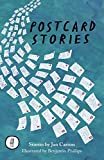 Postcard Stories – Jan Carson (Amazon.com)
Postcard Stories – Jan Carson (Amazon.com)
52 flash stories, all originally written and posted on postcards to friends by this talented writer during a year of writing. Funny, wry, and touching. A wonderful glimpse of her life in Belfast. A slim volume, worth a try.
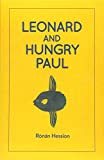 Leonard and Hungry Paul – Ronán Hession (Amazon.com)
Leonard and Hungry Paul – Ronán Hession (Amazon.com)
A gentle, though-provoking read that will stay with you afterwards. Leonard writes encyclopedias for children and Paul is a quiet soul who works part-time as a postman. Their friendship is the heart of the book which helps us to see the beauty in silence and how not every tale needs a fast pace or an explosion to make it important.
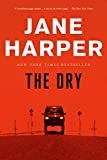 The Dry – Jane Harper (Amazon.com)
The Dry – Jane Harper (Amazon.com)
A small town in the Australian outback is nearly two years into a drought when a tragic death occurs. A city policeman returns for the funeral of his best friend and is drawn into investigating the death while trying to understand an earlier crime that scarred their teen friendship. Brilliant writing, structure, and setting.
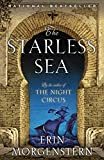
The Starless Sea – Erin Morgenstern (Amazon.com)
I loved her first book, “The Night Circus”, and this one didn’t disappoint. A secret world beneath our own holds all the stories ever created and it is in danger. Perfect fantasy for book and library fans everywhere. Intricate plot with stories within stories so read with your brain switched on.
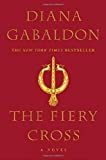 The Fiery Cross – Diana Gabaldon (Amazon.com)
The Fiery Cross – Diana Gabaldon (Amazon.com)
Outlander is my favourite histfic series and I read this book for about the fifth time in 2020 before watching the TV adaptation. Set in pre-independance America and following one family as they find a place in the New World despite the approach of war.
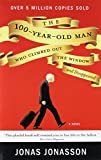 The 100-year-old Man Who Climbed Out a Window and Disappeared – Jonas Jonasson (Amazon.com)
The 100-year-old Man Who Climbed Out a Window and Disappeared – Jonas Jonasson (Amazon.com)
Picked this up second-hand and flicked into it while queuing. Hooked instantly by the feisty old man and his adventures. Very funny. There’s also a sequel, can’t wait.
 The Wheel of Time Series – Robert Jordan (Amazon.com)
The Wheel of Time Series – Robert Jordan (Amazon.com)
I finished reading the 14 books of this epic fantasy series this year. It’s set in a medieval-style world with plenty of magical creatures and quests. Along with strong male characters we also have feisty female characters from queens to village healers to leaders of rebel magic groups. Link is to a box-set but there are various editions, shop around.
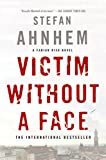 Victim Without a Face – Stefan Ahnhem (Amazon.com)
Victim Without a Face – Stefan Ahnhem (Amazon.com)
I read this in the spring and I know I read until 4.30a.m. to finish it and can still recall the tense, twisty, ending. Fast paced, well plotted, Scandi thriller with characters you care about. What more do you need?
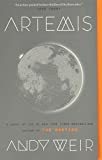 Artemis – Andy Weir (Amazon.com)
Artemis – Andy Weir (Amazon.com)
I loved “The Martian” so I rushed to get this in hardback. He’s back in space, this time on the moon but the book isn’t about NASA and space pirates this time. The moon has been colonised by Earth and it’s about to encounter its first heist. Readers, he had me at “moon heist”. Well written, good science, great setting, twisty heist.
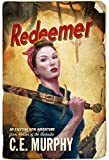
Redeemer – CE Murphy (Amazon.com)
Rosie the Riveter meets Buffy the Vampire Slayer, as a factory worker at the end of WWII discovers she has a rare talent for fighting demons. It’s just that she wants to sort out her life before her boy comes home from the front line, so could the demons hang on a minute please?
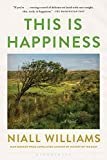 This is Happiness – Niall Williams (Amazon.com)
This is Happiness – Niall Williams (Amazon.com)
Niall Williams is a beautiful writer but not only is his prose elegant, his characters stay with you after you close the book, and his plots are compelling. I have an entire section of his books on my shelves (a rare honour). This one follows a small town when the team arrives to bring electricity. Part coming-of-age and part love song to the past, it will transport you to rural Ireland in the mid 1900s.
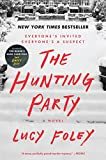 The Hunting Party – Lucy Foley (Amazon.com)
The Hunting Party – Lucy Foley (Amazon.com)
If you travel on the train through the western Scottish highlands you will pass these tiny railway stations in the middle of nowhere. They serve deer hunting estates for absent landlords. Some are rented out to high-paying guests. When a group of old college friends gather at one for a snowbound reunion the tensions are immediately obvious. When a body is found, it gets a lot more serious.
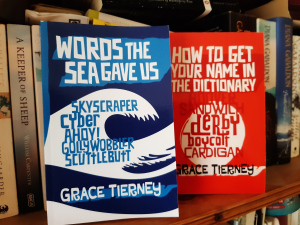
Words The Sea Gave Us & How To Get Your Name In The Dictionary – Grace Tierney (Amazon.com)
My first two books inspired by this blog are out now in paperback and ebook (all the ways to get them are listed here along with reader reviews etc). “Words The Sea Gave Us” covers nautical words and phrases from ahoy to skyscraper. “How To Get Your Name In The Dictionary” explores the lives of the people whose names became part of the English language including Boycott, Sandwich, Guillotine, Casanova, and Fedora.
Right, that’s enough book chat. Next week I’ll be back with strange and unusual words. Wishing you happy reading in 2021.
Until next time happy reading, writing, and wordfooling,
Grace (@Wordfoolery)
p.s. this post contains affiliate links which make a small payment to the blog if you choose to purchase through them. #CommissionsEarned. Alternatively, you can use my digital tip jar to say thanks for this year’s words.
p.p.s. You can read about my 2019 and 2018 Books of the Year too.
December 21, 2020
Mistletoe – an Unromantic History
Hello and Happy Christmas,
With only a few days to go until Christmas 2020, it feels like the right time to chat about the rather unromantic history of the classic Christmas evergreen, mistletoe. You probably know the tradition of kissing underneath it, but trust me there’s more to it than that when you dive into its word history.

The word mistletoe comes from mister (the name of the shrub) plus an Old English word for twig. The origin of mistle isn’t very romantic though. It was German originally and either comes from mist (dung) or mash (the malt and water mix using in brewing). These are for earthy reasons. The dung connection is because the plant spreads its seeds via bird droppings and the mash connection is because the berries are so sticky.
The origins of the mistletoe tradition springs more from Viking and yuletide celebrations than Christmas and it involves a touch of murder.
Odin, as you may recall, was the head of the Viking gods. His wife Frigg had a son called Baldur, known as Baldur the brave and the beautiful. He was beloved by all but as a result his half-sibling Loki, yes the one from Avengers, was jealous. When Baldur began having nightmares about his own death his doting mother made every animal, vegetable, and mineral in the universe swear never to hurt him. The only thing she didn’t bother with was mistletoe which grew close to the ground and looked weak.
Afterwards the other gods enjoyed throwing spears, arrows, rocks, and other items at Baldur and watching them fall away at the last moment thanks to their vow. When Loki discovered the mistletoe exception he made a short javelin of the mistletoe and tricked one of the other gods into throwing it and it killed Baldur. Since that day the plant is banished to grow high in the branches of trees and always to be hung high in our homes when used as a decoration at this time of year.
If you’re still keen on kissing under the mistletoe after the stories of bird droppings and murder you should be aware of the most important rule. With each kiss a berry is removed from the bunch and when they are all gone, no more kisses may be stolen beneath it.
Until next time happy reading, writing, and wordfooling,
Grace (@Wordfoolery)
December 14, 2020
Are you a Mugwump?
Hello,
This week’s word is mugwump, a word I collected for my list some time ago and which I absolutely love for the way it sounds aloud.
Mugwump is an obsolete American English slang word so don’t fret if you haven’t heard it before, however it could easily come back into use in modern times, so feel free to adopt it today.
What is a mugwump and are you one? A mugwump has two potential meanings 1) somebody who left the Republican Party in 1884 (more on that in a moment) or 2) a person who remains neutral and independent in their political views
Mugwump entered American English in the 1830s as a joke word for an important person or boss. This was borrowed from the Algonquian Native American Indian word mugquomp for important person or war leader. By the 1840s it was being used satirically to indicate somebody who thinks they are important, but may not be in reality.
Mugwump gained a political dimension in 1884 when a group of Republicans refused to support their party’s presidential candidate James G. Blaine as a result of corruption issues, and threw their votes to the Democratic candidate, Grover Cleveland, instead. Cleveland was duly elected president.
The rebellious Republicans were christened mugwumps as a term of abuse but they embraced it. Their independence later prompted a humourist (whom I am yet to identify) to define a mugwump as “a bird who sits with its mug on one side of the fence and its wump on the other”. As a political slur it was revived by Boris Johnson in 2017 against the leader of the Labour party.
Until next time happy reading, writing, and wordfooling,
Grace (@Wordfoolery)
p.s. I’ll be chatting about Christmas words – tinsel, wassail, mistletoe, and carol – on LMFM this Wednesday at 12.15 so tune in if you’re local, listen online, or check the podcast later. Be prepared for Viking legends, pagan rituals, and King Henry VIII along the way.
p.p.s. Today is the last day to order my paperbacks from Amazon for reliable Christmas delivery, but signed copies are still available from me and ebooks can be gifted right up to Christmas Eve.



